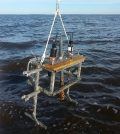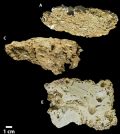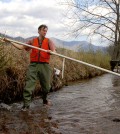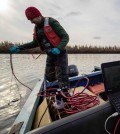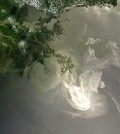Posts for tag "University of Georgia"
Upper Oconee Watershed Network Celebrates 20 Years of Citizen Science
The Upper Oconee Watershed Network recently celebrated 20 years of water sampling and citizen science in Georgia.
- Posted July 25, 2018
Researchers Track Glacial Meltwater On Its Surprising Journey
Researchers stationed in Greenland tracked the fate of glacial meltwater as it wormed its way around the island nation to determine effects on productivity.
- Posted January 25, 2017
Georgia Coastal Wetlands: 35 Percent Marsh Plant Biomass Drop
U. of Georgia scientists find that coastal wetlands in the state have registered a 35 percent marsh plant biomass drop between 1984 and 2011.
- Posted August 3, 2016
Nutrient Conditions In Georgia’s Ogeechee River
A study in Georgia’s Ogeechee River estuary sampled with the incoming tide to provide data on nutrient pollution for state modelers.
- Posted July 5, 2016
Fate Of Greenland Meltwater Affected By Winds, Currents
In recent decades, researchers have watched as land ice on the island of Greenland has melted, spurring questions about the impacts to sea levels. But what has not been questioned as much is the fate of all...
- Posted June 13, 2016
Remote Cameras Confirm Wildlife In Chernobyl Exclusion Zone
University of Georgia scientists used remote cameras to confirm the presence of wildlife in the Chernobyl Exclusion Zone.
- Posted May 4, 2016
Massive Coral Reef Found In Amazon River
An international team of researchers, including scientists from the University of Georgia, have discovered a massive coral reef at the mouth of the Amazon River. The surprise discovery is believed to have been put off for some...
- Posted May 3, 2016
Stream Water Quality Up With More Vegetation In Appalachian Mountains
University of Georgia researchers find that the key to stream water quality in the southern Appalachian Mountains is plenty of surrounding vegetation.
- Posted March 17, 2016
Georgia’s Lake Herrick A Troubled Urban Lake
University of Georgia teachers and students use Lake Herrick, beset by fecal coliform bacteria, as a living lab while working to clean it up.
- Posted January 27, 2016
Arctic Ocean Biochar Could Increase With Global Warming
As the climate warms, researchers determine biochar composition and flow increase into the Arctic Ocean.
- Posted January 19, 2016
After Deepwater Horizon, Oil Dispersants Limited Natural Hydrocarbon Consumers
A study led by scientists at the University of Georgia finds that dispersants used after the Deepwater Horizon disaster limited natural oil-eating microbes.
- Posted November 13, 2015
Invasive Species Range Largely Dependent On Time Since Introduction
A study released by the University of Georgia determines which factor is causing such high numbers of non-native species invasions in marine waters. Invasive species are a global issue, mainly caused by organisms stowing away in ballast...
- Posted August 27, 2015
Scientist: Studying Deepwater Horizon Effects Difficult Due To Lacking Baseline Data
In a press release from the University of Georgia, a professor lays out some ways in which studying the Deepwater Horizon oil spill and other disasters impacting the environment is currently difficult due to a lack of...
- Posted August 13, 2015
Anaerobic Process Regulates Methane Production In Freshwater Wetlands
Freshwater wetland methane production has an unexpected gatekeeper, according to a recent press release from the University of Georgia. It turns out that the production hinges on anaerobic methane oxidation, which is in turn regulated by freshwater...
- Posted July 9, 2015





